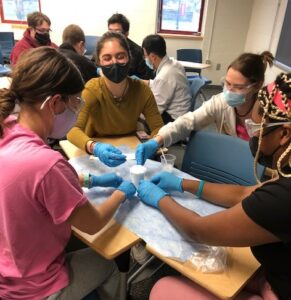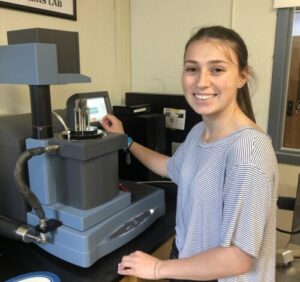CHE 311: Transport Phenomena
Transport Phenomena is a junior-level core course focusing on continuum descriptions of momentum (fluid mechanics), heat, and mass transport with emphasis on the analogies between all three. This course covers the fundamental physics and the development of conservations laws and transport coefficients that describe each of these processes. These methods are applied to solve diverse problems across engineering disciplines as well as in biology, medicine, and material science. Hands-on laboratory experiences on these topics are offered in CHE 312 (Experimental Design I).
A trailer for this course is available here.
CHE 331: Polymers
Polymers are ubiquitous in modern life and represent one of the fastest growing and impactful fields of study. Biopolymers such as DNA and proteins form the basis of life and synthetic polymers make modern living possible ranging from automobile and aerospace travel to clothing, packaging, and pharmaceuticals. New innovations and approaches often enable advances in tissue engineering, 3D printing, drug delivery, electronics, space travel, and more. CHE 331 is an upper-level technical elective that explores the wide-ranging and contemporary applications of polymers and builds a fundamental understanding of the synthesis, processing, and characterization of polymers. Topics span molecular-level structure to bulk properties, mechanical behavior, and processing methods. Contemporary issues ranging from sustainability and the role of plastics throughout the pandemic are discussed, and advanced materials such as ‘smart’ and self-healing polymers are explored.
CHE 322: Experimental Design II
Experimental Design II is the second course in a three-course sequential experimental design sequence within the chemical engineering degree program. This course covers planning experiments using various statistical designs and executing them using pilot-scale equipment to illustrate the principles of fluid flow and heat/mass transfer. Troubleshooting and estimation are also covered. There is a strong emphasis on statistical analysis, writing, and oral presentation.
ES 231: Nature of Materials

Nature of Materials is an introductory materials science course designed to introduce the chemical and physical principles that determine the structure and function of engineering materials including metals, ceramics, polymers, and composites. This course emphasizes the interdisciplinary field of materials science and engineering, and the overarching processing-structure-property-performance relationships in engineering materials. Manipulation of chemical and atomic structure, and the effects on resulting mechanical, chemical, electrical and optical properties are studied. Material failure and modern challenges of engineering materials are explored.
CHE 393/394: Independent Research in Chemical Engineering
Independent Research is a one or two semester course which provides students with an opportunity to engage in a hands-on, independent research experience. Students work with their faculty mentor to develop a research proposal, and then design and execute experiments in pursuit of their research objectives. Scientific findings are presented in an oral and written format at the conclusion of the semester.
CHE 495/496: Thesis

Honors thesis is a year-long course for select senior students to engage in a high-quality, independent research experience under the guidance of faculty mentor. Students work with their faculty mentor to develop a research proposal, and then design and execute experiments in pursuit of their research objectives. Scientific findings are presented in an oral and written format at checkpoints throughout the course. By completing this course, students earn departmental honors at graduation.
Some examples of honors thesis I have advised:
Brittany Dobson, Development and Characterization of Bio-based Thermosets from Birch Bark
Jacob Miller, Strengthening Stereolithographic 3D Prints by Imparting Defects
James Hastie, Fundamental Studies of CO2-Triggered Polymer Swelling
Megan Dodge, Assessing Tunability and Hydrolytic Degradation of Bio-Based Thermosets